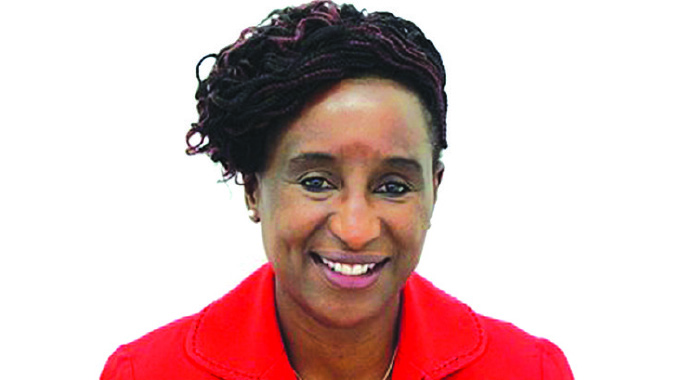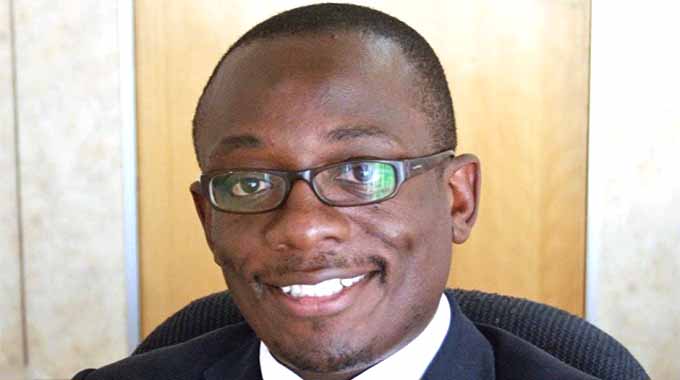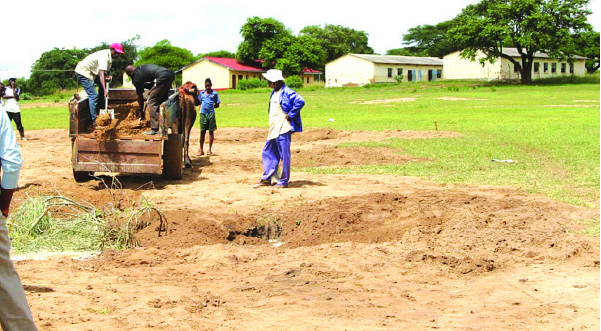Women’s Day: ‘I did it, you too, can lead in any field’

Roselyne Sachiti
Features, Health & Society Editor
Today, Zimbabwe joins the world in celebrating the International Women’s Day (IWD) 2021.
Celebrated on March 8 each year, this year’s theme is ‘Women in leadership: Achieving an equal future in a COVID-19 world.’
On International Women’s Day, as the world battles with Covid-19, The Herald spoke to inspiring women who have made a mark in Zimbabwe in the areas of medicine and law.
The women are Dr Nyaradzo Mavis Mgodi, who is a senior researcher at the University of Zimbabwe Clinical Trials Research Centre (UZ-CTRC); Dr Junior Mutsvangwa a Clinical Microbiologist (PhD) with 15 years’ experience in laboratory diagnostics; and legal practitioner and vastly experienced child rights advocate Petronella Nyamapfene.
They encourage younger women and girls to take up the task nomatter the field.
Dr Mgodi, (MBChB, MMed) has over 10 years of experience leading and conducting clinical trials for HIV prevention in women of reproductive age in Zimbabwe, Botswana, Kenya, Malawi, Mozambique, South Africa, eSwatini, Tanzania and Uganda.
She holds several portfolios in the medical and biomedical sciences fields, including but not limited to principal investigator at the UZ-CTRC where she leads multiple studies assessing safety and effectiveness of several biomedical interventions for HIV prevention.
Dr Mgodi is protocol co-chairperson for the dapivirine ring study conducted in Sub-Saharan Africa and protocol co-chairperson for the Antibody Mediated Prevention studies conducted in Sub-Saharan Africa, USA, Latin America, and Switzerland.
An HIV Prevention Trials Network Executive Committee member Scientific and ethics reviewer, Dr Mgodi is also a Medical Research Council of Zimbabwe’s National Health Research Development Committee Board member — Medical Research Council of Zimbabwe.
She is a technical advisor — Zimbabwe Population-based HIV Impact Assessment (ZIMPHIA1).
Dr Mgodi has published several peer reviewed articles in scientific journals and serves as a deputy editor for two scientific journals.
She is the Deputy Editor — Journal of the International AIDS Society and also an Associate Editor — Frontiers in Global Reproductive Health – HIV and STIs.
Her list of accomplishments is long and inspiring.
She is also a Policy and Implementation Steering Committee Member for the Global Evaluation of Microbicide Sensitivity (GEMS) project, and also a conference Advisory Committee member — International AIDS Society (IAS).
Dr Mgodi is also a Conference Advisory Committee member — HIV Research for Prevention (HIVR4P).
Her work in biomedical science has been recognised globally through various awards that include the Omololu Falobi Award for Excellence in HIV Prevention Research Community Advocacy — 2016 ; UNESCO L’Oréal Women in Science Award nominee — 2018.
“Besides my work in HIV prevention, I am also currently working on studies assessing different interventions for Covid-19 prevention,” she told The Herald last Friday. “I bring a wealth of experience from HIV prevention and the best practices from the HIV field are being used in Covid-19, hence fast-tracking the development of Covid-19 prevention interventions.”
Dr Mgodi said she arrived where she is because of hard work, diligence, dedication and being afforded the opportunity and support.
“My parents were firm believers of good educating for all their children,” she said. “I did my high school at Eaglesvale High School in Harare and studied Mathematics, Biology, Chemistry and Physics at A level. I then proceeded to study Medicine at the University of Zimbabwe.”
During the six-year undergraduate tenure, Dr Mgodi was awarded a Bachelor of Science Intercalated in Biochemistry (Honors) Degree and received several awards, including the Harry Wulfsohn Medals for excellence in Community Medicine and Psychiatry before graduating in Bachelor of Medicine and Bachelor of Surgery (MBChB) degrees programme with Honours in paediatrics and internal medicine.
“I then worked as a junior/senior resident medical officer and senior house officer before proceeding to Master’s in Medicine postgraduate studies in Pathology at the University of Zimbabwe,” she added.
On International Women’s Day, Dr Mgodi says she has always wanted to be a medical doctor ever since she was a little girl.
“Being a scientist, and a Christian has given me a solid background to be a good, empathetic doctor,” she said. “Medicine is not just a job for me, but a vocation. I am an African woman, with a passion and the scientific and medical prowess to positively impact the quality of life of African women and girls.
“This is very gratifying, and I would not change it for anything. I encourage all young girls planning to embark on Science, Technology, Engineering, and Mathematics (STEM) careers to go for it. The world is your oyster!”
Dr Junior Mutsvangwa
Another inspiring woman in science is Dr Junior Mutsvangwa, a Clinical Microbiologist (PhD) with 15 years’ experience in laboratory diagnostics, biomedical research, surveys, capacity building and health systems strengthening.

Dr Junior Mutsvangwa
She is also a certified monitoring and evaluation (M&E) expert for TB and HIV activities.
Dr Mutsvangwa has been working at a not-for-profit private research organisation, the Biomedical Research and Training Institute (BRTI).
Her work at BRTI is captivating. She has served in various capacities, initially as Laboratory Manager, then Head of laboratories (HOL), currently Senior Research Scientist (SRS)/Principal Investigator (PI) cum Technical Lead.
She acquired additional skills and expertise through participation in various national and international developmental courses and through previous employment with Danish International Development Agency (DANIDA), University of Zimbabwe and National Public Health laboratory, Ministry of Health and Child Care (MoHCC).
The journey has taken her two decades with relentless efforts against a myriad of challenges.
“Having grown up in a rural area, my intelligence and aspirations were noticed by school teachers, which enabled me to pursue high school and nursing school,” said Dr Mutsvangwa.
“But as I considered enrolling as to be trained as a nurse, which was one of the well-known sought-after professions for young naturally science gifted girls/women in possession of outstanding Cambridge secondary results, I stumbled on this least known STEM related field of Medical Laboratory Sciences.”
Unfortunately, this was in 1981 at the interphase of opening up of such professions to blacks.
There were very limited places for African girls as for Dr Mutsvangwa, this was still experimental because elsewhere history had shown that black girls had a high rate of drop out.
She pulled through the highly competitive selection process and through her education and work experience, has been able to engage in cutting-edge TB and HIV research in Zimbabwe, done her PhD and since 2020 has been spearheading a number of studies some of whose outputs have resulted in policy and guideline changes.
Dr Mutsvangwa has also been instrumental in adoption of up-to-date technologies for following up the epidemiology of such infectious disease pandemics as the HIV and the SARS COV2.
She said this years’ theme is motivational for her as a woman in science.
“Quoting from IWD 2021, ‘A challenged world is an alert world. From challenge comes change.’ I am happy with myself as my prudence has made me fit well into this year’s theme #ChooseToChallenge,” she said.
“It has further endorsed my function as a woman scientist whose interests are exploring and experimenting within the medical sciences to continue making a positive change to human health.”
Dr Mutsvangwa said though the infected and affected might not know the “how” part of solving their plight; as a woman scientist who is a bit more equipped with tools on the “how”, she takes the challenge to also contribute to the welfare of her own, the women, especially considering that women tend to affected and infected in a mostly patriarchal dominated science environment.
“I hope I am not alone, but together we can! Best solutions come from the infected,” she said. “Science and everyday life cannot and should not be separated. There is insurmountable evidence in literature on women’s unique health concerns.”
Dr Mutsvangwa said one of the most important areas of study being intersection of socio-economic factors and women’s health, researchers attribute the risk to a number of factors, including lack of access to preventive care, limited health education, and high stress levels.
She said literature has it that research is 90 percent failure and 10 percent success.
“As a woman researcher, it’s so important to remember that whatever you are doing its contributing to body of knowledge that makes the world a better place to live,” she said.
“Never give up, given that you will treading on unfamiliar ground, failures and ups and downs are routine encounters . . . this is just part of the process, and with each failure more insight is gained leading to reaching to the intended ultimate end goal.”
Dr Mutsvangwa added that to be a scientist though it comes with quite some substantial sacrifice particularly women, can be a great adventure as the situations that need research solutions will always present.
“Despite what we already know this is really a small proportion compared to what we still need to know,” she said. “Gloria Steinem, a world-renowned feminist, journalist and activist once explained ‘The story of women’s struggle for equality belongs to no single feminist, nor to any one organisation, but to the collective efforts of all who care about human rights.’ So, make International Women’s Day your day and do what you can to truly make a positive difference for women.”
Dr Mutsvangwa said with determination and willpower women can take this challenge up.
“And of course there is more with numbers don’t forget the responsibility of taking others with you,” she said.
Patronella Nyamapfene
Legal practitioner and child rights advocate Patronella Nyamapfene (LLB) Degree from the University of Zimbabwe, (MSc) in International Relations and a Masters in Law, was admitted to practice in Zimbabwe in 2001 where she registered as a legal Practitioner, Notary Public and Conveyancer.

Petronella Nyamapfene
Nyamapfene has worked in private law firms, non- governmental organizations and private corporates where she has gained experience in commercial and civil litigation.
Through her work, she has extensive experience working with non profit making institutions, held various positions including being the Director for Justice for Children Trust which litigates on child related issues in Zimbabwe.
This has exposed her to research which contribute to legal reform.
During that time, she acquired vast knowledge and experience on how to direct and manage Trusts and Private Voluntary Organisations whilst also playing a critical role in advising government in areas that require law reform.
Additionally, she lectured international law at the University of Zimbabwe from 2007-2009 which helped to develop her interest in training. She is one of the lawyers requested by government, civic society regionally and internationally to present in workshops and conferences on the Zimbabwean Legal system. Petronella has sat on various boards of corporates, parastatals and non-profit making organisations among them Africa Community Publishers, Zimbabwe Civic Education Trust, The Anti Domestic Violence Council, among others.
This opportunity helped her to play a critical role on corporate governance of institutions, thus her involvement in corporate governance and various pieces of legislation.
Nyamapfene said the road for girls to become professionals in areas that were once and still male dominated like medicine and law is not easy.
“It calls for young girls and women to put it all,” she said. “It requires them to burn the midnight candle, to read, not to give excuses ‘that I was not able to read because I had period pain. I did not manage to go to court because I am pregnant and need special care.’ It’s a dog eat dog situation out there.”
Nyamapfene said women should be competitive even if they have made it to law school.
“For you to attain good grades you need to be competitive, and work extremely hard,” she said. “Gone are the days when women would get positions through affirmative action. Entering some fields remains male dominated.
“Recently, six judges were appointed but only one was a woman, Mai Kabasa. Does it mean there were no other female lawyers out there who qualified to be appointed? As women we also need to go in to these spaces, to populate them. It remains a boys’ club.
“We need to create our own spaces. In boys clubs they are talking about businesses, looking for opportunities yet in the kitchen parties most go to we are talking about pleasing so and so.”
Today, she encourages women to create clubs to empower and identify business opportunities for women.
“Even as we interact as girls at law and medicine schools,” said Nyamapfene. “Let us create these clubs that diffuse the boys’ clubs where decisions to give each other’s business are being made.
“To get there we need a lot to change our conversation as we meet so that they become about business.”
Nyamapfene said identifying careers that pay well, those deemed male dominant, the engineering, law, medicine etc was critical for women’s empowerment.
“Let’s break the glass ceiling the way Kamala Harris has broken it in the US. Let us as women fill up the bench at Zimbabwe’s Supreme Court,” she said.









Comments